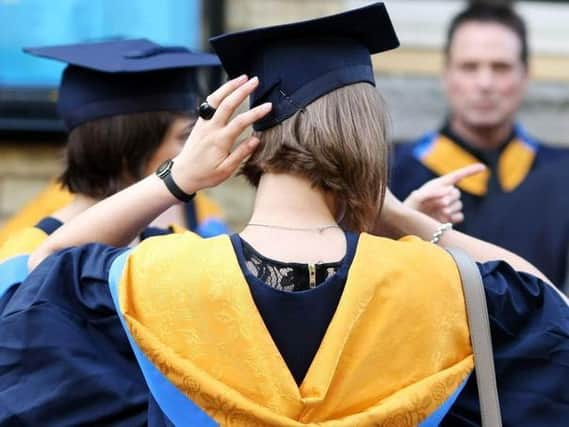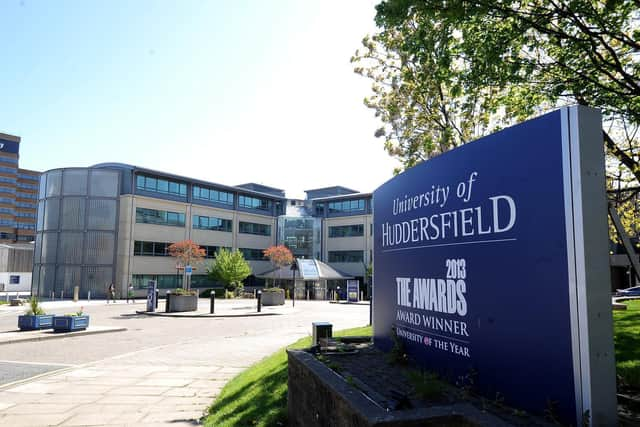'Big rise in number of first class degrees handed out in Yorkshire - this is what universities have to say'


Their comments come after the higher education watchdog found the proportion of first class degrees awarded has increased by 88 per cent in the last eight years.
Analysis from the Office for Students (OfS) found that the proportion of graduates who attained top degrees rose from 15.7 per cent in 2010-11 to 29.5 per cent in 2018-19, prompting concerns about grade inflation.


Advertisement
Hide AdAdvertisement
Hide AdMuch of the increase cannot be explained by factors that may affect attainment, the report said.
Over 42,000 more students graduated with firsts in the summer of 2018-19 than eight years before, the figures showed, but the increase has "slowed" compared with previous years.
Between 2017-18 and 2018-19, the proportion of firsts only rose by 0.2 percentage points, the data showed.
Ministers and the higher education watchdog have repeatedly called on universities to clamp down on grade inflation.


Advertisement
Hide AdAdvertisement
Hide AdInstitutes awarding firsts to more than 35 per cent of graduating students in 2018-19 included the University of Bradford, the University of Huddersfield and the University of Leeds. In 2010-11, they had awarded the highest level degrees to 10.8, 15.1 and 17.7 per cent of students respectively.
Just one institute in the region - the Leeds College of Music saw a drop from 28 per cent to 26.7 per cent.
In response to the significant rise the University of Bradford, said it was fully committed to maintaining the highest academic standards.
And noted its methods for calculating classifications in the base year had been out of step with sector approaches. Since bringing its methods into line with others, it said rises in 'good honours' had been in line with sector norms and the result of measures in improvement.


Advertisement
Hide AdAdvertisement
Hide AdA spokesman from the University of Bradford said: "In the base year used in these measures, the method used to calculate degree classifications by the University was out of step with sector approaches, leading to significantly below benchmark levels of first and upper second class degrees, placing our students at a relative disadvantage to students at other institutions.
"The University reviewed and amended its assessment regulations, taking into account sector wide approaches to address this concern and bring the approach for Bradford students in line with the sector, which accounts for the increase in that particular year.
"Since that time, increases in ‘good honours’ have been in line with sector norms and driven by active measures taken by the University to enhance its learning, teaching and student experience, increase access to education and to improve attainment."
Likewise, the University of Huddersfield said any increase was a reflection of its "strong emphasis on learning and teaching" as no changes had been made to its assessment algorithms.
Advertisement
Hide AdAdvertisement
Hide AdA spokeswoman from the University of Huddersfield said: "Over the past 10 years The University of Huddersfield has placed a strong emphasis on learning and teaching and this is what explains the improvement in our students’ performance.
"There have been no changes to our assessment algorithms during this period. Our emphasis on teaching and learning includes being the first University to require that all of our academic staff have a teaching qualification and we are joint first in England for professionally qualified teaching staff (HESA 2020)."
The University of Leeds was approached for comment by The Yorkshire Post.
Elsewhere in West Yorkshire, Leeds Arts University saw a change from 19.4 to 26.1 per cent, Leeds Beckett (10.1 to 23.5) and Leeds Trinity University (7.6 - 27.5).
Advertisement
Hide AdAdvertisement
Hide AdIn South Yorkshire the University of Sheffield had a change from 18.2 - 30.8 and Sheffield Hallam University (15.4 - 31.3). And in North Yorkshire the University of York saw a change from 20.5 - 28.4 and York St John University (10.9- 22.7).
The data shows there has been a fall of 2.1 percentage points nationally since 2017-18 in the proportion of students awarded the two top grades despite beginning university with grades below three Ds at A-level.
Across England the new figures showed more than 42,000 more students graduated with firsts in the summer of 2018-19 than eight years before, but the increase has "slowed" compared with previous years.
But students entering university with grades below DDD were still almost four times as likely to receive a first class degree in 2018-19 than in 2010-11.
Advertisement
Hide AdAdvertisement
Hide AdThe report concluded: "There is still strong evidence of significant unexplained sector attainment increases between 2010-11 and 2018-19."
Nearly three-quarters (73 per cent) of the 147 providers included in the analysis saw "unexplained" increases in first class degrees between 2017-18 and 2018-19, the analysis found.
Overall, 29.5 per cent of students graduated in the summer of 2019 with a first class degree but, of that figure, nearly half (14.3 percentage points) of it could not be explained by changes in the graduate population.
Nicola Dandridge, chief executive of the OfS, said: "This data shows that the increase in the proportion of first class degrees awarded in 2018-19 has slowed compared to previous years, with a small increase from last year in the percentage of first class degrees which cannot be explained by other factors.
Advertisement
Hide AdAdvertisement
Hide Ad"While this may indicate that the brakes have been applied, it is clear that grade inflation remains a significant and pressing issue in English higher education.
"Unexplained grade inflation risks undermining public confidence in higher education, and devaluing the hard work of students. Degrees must stand the test of time, which is why the OfS will continue to address this issue at both a sector-wide and individual university level.
"Where we have concerns about unexplained grade inflation at any particular university or college, we are prepared to intervene to protect the integrity of the degree awarding system for all students."
A Universities UK (UUK) spokesman said: "It is essential that degree classifications are meaningful for students and employers, and universities are taking action to improve transparency, fairness and reliability in the way they award degrees.
Advertisement
Hide AdAdvertisement
Hide Ad"In July 2020 universities across the UK agreed a new set of principles for degree algorithm design, having overwhelmingly supported a sector-wide statement of intent on tackling grade inflation in May 2019.
"We will be publishing a review of progress later this year exploring whether further action is needed."
A Department for Education spokesperson, said: "The UK has a world-class reputation for higher education, and it is vital that neither low quality degrees nor grade inflation undermine standards.
“It is unacceptable that the proportion of firsts continues to rise, despite repeated calls for action. Awarding powers should be used responsibly and we expect the Office for Students to take action where this is not the case.”
Advertisement
Hide AdAdvertisement
Hide AdYorkshire Universities charity were approached for comment by The Yorkshire Post.
Yorkshire university changes in first class degrees:
- The University of Bradford10.8 per cent - 35.1 per cent
- The University of Huddersfield 15.1 per cent - 39.2 per cent
- The University of Leeds 17.7 per cent - 35.4 per cent
- The University of Hull 9.8 per cent - 26.5 percent
- Sheffield Hallam University 15.4 - 31.3
- The University of Sheffield 18.2 - 30.8
- Leeds Trinity University 7.6 - 27.5
- Leeds Arts University 19.4 - 26.1 per cent
- Leeds Beckett 10.1 - 23.5.
- University of York 20.5 - 28.4
- York St John University 10.9- 22.7
- Leeds College of Music (drop) 28 per cent - 26.7 per cent
_________________
Support The Yorkshire Post and become a subscriber today.
Your subscription will help us to continue to bring quality news to the people of Yorkshire. In return, you'll see fewer ads on site, get free access to our app and receive exclusive members-only offers. Click here to subscribe.
Comment Guidelines
National World encourages reader discussion on our stories. User feedback, insights and back-and-forth exchanges add a rich layer of context to reporting. Please review our Community Guidelines before commenting.